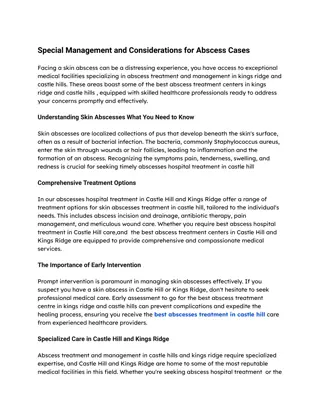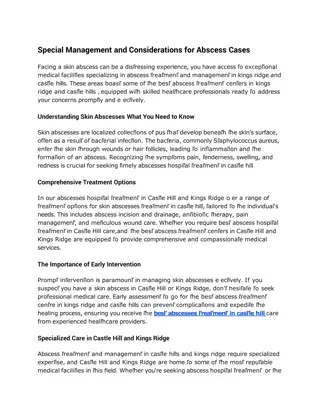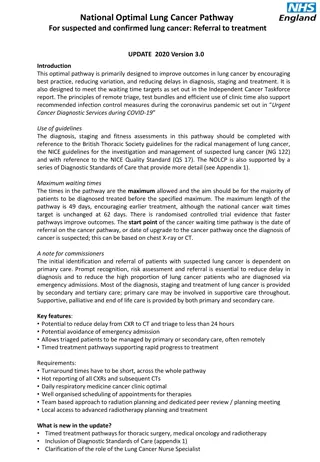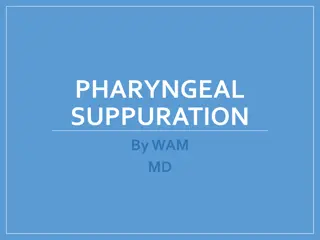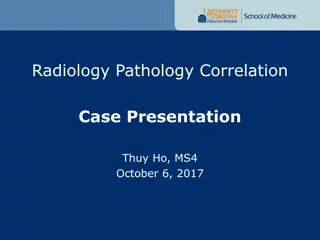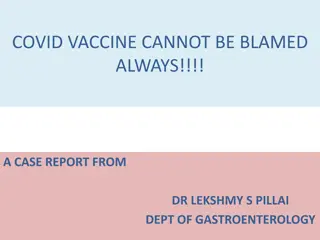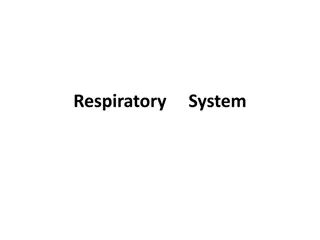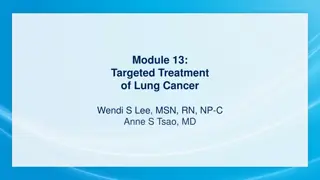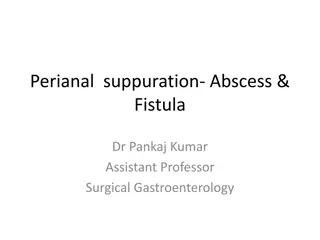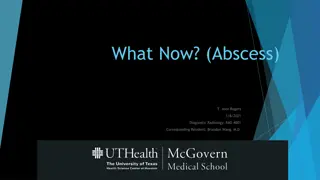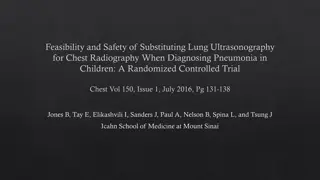Lung Abscess: Definition, Symptoms, Causes, and Treatment
A lung abscess is a serious condition characterized by a pus-filled cavity in the lungs caused by bacterial infection. Learn about its types, symptoms, causes, diagnosis, complications, and treatment options.
Download Presentation

Please find below an Image/Link to download the presentation.
The content on the website is provided AS IS for your information and personal use only. It may not be sold, licensed, or shared on other websites without obtaining consent from the author.If you encounter any issues during the download, it is possible that the publisher has removed the file from their server.
You are allowed to download the files provided on this website for personal or commercial use, subject to the condition that they are used lawfully. All files are the property of their respective owners.
The content on the website is provided AS IS for your information and personal use only. It may not be sold, licensed, or shared on other websites without obtaining consent from the author.
E N D
Presentation Transcript
StudyMafia.Org Lung Abscess Submitted To: Studymafia.org Studymafia.org Submitted By:
Table Contents Definition Introduction Types of lung abscess Symptoms of lung abscess Causes of lung abscess Diagnosis of lung abscess Complications of lung abscess Treatment of lung abscess Conclusion 2
Definition A lung abscess is a pus- filled cavity in your lung surrounded by inflamed tissue. It usually results from breathing bacteri a that normally live in your mouth or throat into the lungs, leading to an infection. 3
Introduction A lung abscess is a cavity filled with pus. In most cases, it s the result of a bacterial infection in lung tissue. The infection causes lung tissue to die. Pus collects in the resulting space. A lung abscess can be challenging to treat, and it can also be life threatening. If a lung abscess lasts for under 4 to 6 weeks, it s considered acute. A lung abscess that lasts for longer than that is considered chronic. 4
Types of lung abscess Primary lung abscess Primary abscesses are caused by an infection within the lung. Alcohol use disorder is the condition most likely to make a person susceptible to developing a lung abscess. People with alcohol use disorder often experience bouts of vomiting and altered levels of consciousness. These complications increase the likelihood of a person inhaling stomach contents and bacteria into the lungs, which can cause an infection. 5
Types of lung abscess Secondary lung abscess Secondary abscesses are caused by anything other than an infection that starts in the lung. Examples include: An obstruction of the large airways in the lung Coexisting disease in the lungs Infections from other parts of the body that spread to the lung Secondary lung abscesses are less common than primary lung abscesses. 6
Causes of lung abscess A number of things can cause a lung abscess, including: Not being able to cough: This often happens as a result of: Anesthesia Alcohol or drug use Nervous system diseases Sedation Your immune system isn t working well: This can let in germs that aren t usually found in your mouth or throat, like fungi or the bacteria that cause tuberculosis, strep throat, and MRSA. 8
Causes of lung abscess Poor oral health: People with gum disease are more likely to get an abscess. Blocked airway: Mucus can form behind a tumor or foreign object in your windpipe and lead to an abscess. If bacteria get into the mucus, the blockage stops you from coughing it out. Blood-borne causes: It s rare, but bacteria or infected blood clots from an infected part of your body can travel through your bloodstream and into your lung, where they cause an abscess. 9
Diagnosis of lung abscess A lung abscess is typically diagnosed in two ways: Chest X-ray: This shows your doctor where the abscess is. CT scan of the chest: Your doctor is looking for an air- and fluid-filled cavity in the middle of your lung. The doctor might also use a device called a bronchoscope, a thin tube with a light and a camera on the end, to get samples of sputum or lung tissue for more tests 10
Complications of lung abscess Chronic abscess: That s what it s called if it lingers for more than 6 weeks. Empyema: This is when an abscess breaks into the space between your lungs and chest wall and fills the space with pus. Bleeding: It s rare, but sometimes an abscess can destroy a blood vessel and cause serious bleeding. Bronchopleural fistula: This is an opening between the tubes in your lungs and layers that cover them. 11
Treatment of lung abscess There are several ways to treat a lung abscess: Antibiotics: Most people get antibiotics into a vein for up to 3-8 weeks. You might switch to oral antibiotics after that. You ll take them until a chest X-ray shows the abscess is gone. Drainage: You may need this if your abscess is 6 centimeters or more in diameter. Your doctor will use a CT scan to guide them as they insert the drain through your chest wall into the abscess. 12
Treatment of lung abscess Surgery: It s rare, but some people need surgery to remove the part of the lung with the abscess Sometimes the entire lung has to come out to get rid of the infection. Surgery can also help remove a foreign object. 13
Conclusion Antibiotic treatments will help most people make a full recovery. And the earlier you get treatment, the better. It may be harder to bounce back if you re weak, ill, have an impaired immune system, or have a tumor that blocks your airways. 15
References Google.com Wikipedia.org Studymafia.org Slidespanda.com
Thanks To StudyMafia.org


